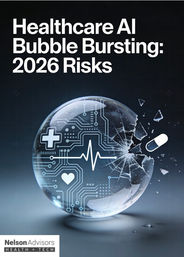Automation in Healthcare: new trend emerging in 2024 away from Robotic Process Automation to Clinical Workflow Automation
- Lloyd Price
- Jun 2, 2024
- 6 min read

Exec Summary
The clinical workflow automation market is expected to continue to grow rapidly in the next 12 months, driven by a number of factors, including:
The increasing complexity of healthcare delivery: Healthcare delivery is becoming increasingly complex, with more providers and organizations involved in the care of each patient. This complexity can lead to errors and inefficiencies.
The rising cost of healthcare: The cost of healthcare is rising, and healthcare organizations are under pressure to find ways to reduce costs. Clinical workflow automation can help healthcare organisations reduce costs by automating tasks and streamlining processes.
The increasing adoption of electronic health records (EHRs): EHRs are becoming increasingly common in healthcare organizations. EHRs can provide a centralised repository for patient data, which can help to improve the efficiency of clinical workflows.
As a result of these factors, healthcare organizations are increasingly investing in clinical workflow automation solutions. This is driving demand for clinical workflow automation solutions, which is in turn driving M&A activity in the clinical workflow automation space.
Some of the specific areas of clinical workflow automation that we expect to see the most M&A activity in the next 12 months include:
Patient scheduling and registration: Patient scheduling and registration is a complex and time-consuming process that can be automated using clinical workflow automation solutions.
Clinical documentation: Clinical documentation is another complex and time-consuming process that can be automated using clinical workflow automation solutions.
Order entry and fulfilment: Order entry and fulfilment is a critical process in the healthcare system that can be automated using clinical workflow automation solutions.
Medication management: Medication management is another critical process in the healthcare system that can be automated using clinical workflow automation solutions.
Corporate Development for Healthcare Technology companies in EMEA
Healthcare Technology Thought Leadership from Nelson Advisors – Market Insights, Analysis & Predictions. Visit https://www.healthcare.digital
HealthTech Corporate Development - Buy Side, Sell Side, Growth & Strategy services for Founders, Owners and Investors. Email lloyd@nelsonadvisors.co.uk
HealthTech M&A Newsletter from Nelson Advisors - HealthTech, Health IT, Digital Health Insights and Analysis. Subscribe Today! https://lnkd.in/e5hTp_xb
HealthTech Corporate Development and M&A - Buy Side, Sell Side, Growth & Strategy services for companies in Europe, Middle East and Africa. Visit www.nelsonadvisors.co.uk

What exactly is clinical workflow automation?
Clinical workflow automation is the use of technology to automate the tasks and processes involved in providing patient care. This can include tasks such as:
Patient scheduling and registration
Clinical documentation
Order entry and fulfilment
Medication management
Laboratory and imaging orders
Referral management
Patient education and engagement
Clinical workflow automation can help healthcare organisations to improve efficiency, reduce costs, and improve patient outcomes. For example, clinical workflow automation can help to reduce the time it takes to schedule a patient appointment, improve the accuracy of clinical documentation, and reduce the number of medication errors.
Clinical workflow automation can be implemented using a variety of technologies, including electronic health records (EHRs), clinical decision support systems (CDSSs), and robotic process automation (RPA). EHRs can be used to automate tasks such as patient scheduling, order entry, and clinical documentation. CDSSs can be used to automate tasks such as drug interaction checking and clinical guideline compliance. RPA can be used to automate repetitive tasks such as data entry and order processing.
Clinical workflow automation is a rapidly growing field, and there are a number of vendors that offer solutions for automating different aspects of clinical workflow. Healthcare organisations are increasingly adopting clinical workflow automation solutions to improve efficiency, reduce costs, and improve patient outcomes.
Here are some examples of how clinical workflow automation is being used in healthcare today:
A hospital might use a clinical workflow automation solution to automate the process of scheduling patients for appointments. This would involve the system automatically checking the patient's availability and the availability of the relevant healthcare providers. The system would then book the appointment and send the patient a confirmation message.
A clinic might use a clinical workflow automation solution to automate the process of documenting patient encounters. The system would record the patient's symptoms, medical history, and physical examination findings. The system would then generate a clinical note that could be reviewed by the healthcare provider and the patient.
A pharmacy might use a clinical workflow automation solution to automate the process of dispensing medications. The system would check the patient's medication history for any potential drug interactions. The system would then dispense the medication to the patient and provide them with instructions on how to take it.
Clinical workflow automation has the potential to revolutionise the way that healthcare is delivered. By automating tasks and processes, clinical workflow automation can help healthcare organisations to improve efficiency, reduce costs, and improve patient outcomes.

Key trends in the clinical workflow automation M&A market
Some of the key trends that we expect to see in the clinical workflow automation M&A market in the next 12 months include:
Continued consolidation of the market: We expect to see continued consolidation of the clinical workflow automation market, as larger companies acquire smaller companies with specialised expertise in specific areas of clinical workflow automation.
Increased investment from private equity firms: We expect to see increased investment from private equity firms in the clinical workflow automation market. Private equity firms are attracted to the clinical workflow automation market because of its high growth potential and the fact that it is a fragmented market with many opportunities for consolidation.
Increased focus on emerging technologies: We expect to see an increased focus on emerging technologies, such as artificial intelligence (AI) and machine learning (ML), in the clinical workflow automation M&A market. Healthcare organisations are increasingly looking for solutions and services that can help them automate tasks and streamline processes using these emerging technologies.
Increased focus on artificial intelligence (AI): We expect to see an increased focus on AI in the clinical workflow automation M&A market. AI is being used to develop new and innovative clinical workflow automation solutions that can help healthcare organisations to improve efficiency and reduce costs.
Increased focus on cloud-based solutions: We expect to see an increased focus on cloud-based clinical workflow automation solutions in the next 12 months. Cloud-based solutions offer a number of advantages over on-premises solutions, such as scalability, flexibility, and ease of use.
Increased focus on interoperability: We expect to see an increased focus on interoperability in the clinical workflow automation M&A market in the next 12 months. Interoperability is the ability of different clinical workflow automation systems to communicate with each other. This is important because it allows healthcare organizations to create a more seamless and efficient clinical workflow.
Overall, the clinical workflow automation M&A market is expected to remain active in the next 12 months, driven by the increasing complexity of healthcare delivery, the rising cost of healthcare, the increasing adoption of EHRs, and the growing demand from healthcare organisations for clinical workflow automation solutions.

Final Thoughts
Clinical workflow automation is the use of technology to automate the tasks and processes involved in providing patient care. It is a rapidly growing field, and there are a number of vendors that offer solutions for automating different aspects of clinical workflow.
The future of clinical workflow automation is very bright. As technology continues to evolve, we can expect to see even more innovative and effective solutions emerge. Some of the key trends that we expect to see in the future of clinical workflow automation include:
Increased use of artificial intelligence (AI) and machine learning (ML): AI and ML are already being used in clinical workflow automation to automate tasks such as clinical decision support and medication management. In the future, we can expect to see even more widespread use of AI and ML in clinical workflow automation. For example, AI and ML could be used to develop automated systems that can diagnose diseases, develop treatment plans, and monitor patients' progress.
Increased focus on patient engagement: Clinical workflow automation can be used to improve patient engagement by providing patients with access to their own health information and by automating tasks such as appointment scheduling and medication reminders. In the future, we can expect to see even more clinical workflow automation solutions that are designed to improve patient engagement.
Greater integration with other healthcare systems: Clinical workflow automation solutions are becoming increasingly integrated with other healthcare systems, such as electronic health records (EHRs) and patient portals. This integration is helping to create a more seamless and efficient healthcare experience for both patients and providers.
Overall, the future of clinical workflow automation is very promising. As technology continues to evolve, we can expect to see even more innovative and effective solutions emerge that can help healthcare organizations to improve efficiency, reduce costs, and improve patient outcomes.
Here are some specific examples of how clinical workflow automation might be used in the future:
AI-powered chatbots could be used to triage patients and provide them with basic medical advice.
ML could be used to develop personalised treatment plans for patients.
RPA could be used to automate tasks such as data entry and order processing.
Clinical workflow automation could be integrated with wearable devices to collect patient data and monitor their health.
Clinical workflow automation has the potential to revolutionize the way that healthcare is delivered. By automating tasks and processes, clinical workflow automation can help healthcare organisations to improve efficiency, reduce costs, and improve patient outcomes.
Corporate Development for Healthcare Technology companies in EMEA
Healthcare Technology Thought Leadership from Nelson Advisors – Market Insights, Analysis & Predictions. Visit https://www.healthcare.digital
HealthTech Corporate Development - Buy Side, Sell Side, Growth & Strategy services for Founders, Owners and Investors. Email lloyd@nelsonadvisors.co.uk
HealthTech M&A Newsletter from Nelson Advisors - HealthTech, Health IT, Digital Health Insights and Analysis. Subscribe Today! https://lnkd.in/e5hTp_xb
HealthTech Corporate Development and M&A - Buy Side, Sell Side, Growth & Strategy services for companies in Europe, Middle East and Africa. Visit www.nelsonadvisors.co.uk



















































Comments